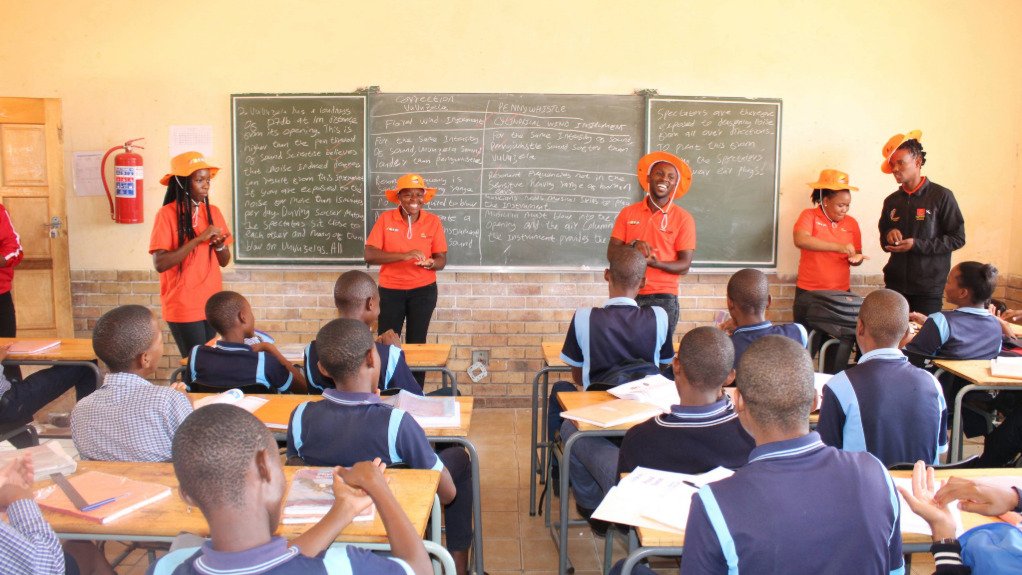DPWI aims to resolve skills deficit



BERNICE SWARTS The deputy minister notes that the advancing transformation continues to be a national priority, but that another priority is to attract and retain female engineers
Photo by DPWI
SCHOOL DEVELOPMENT The Schools Programme by the Department of Public Works and Infrastructure is a school development intervention programme targeted at learners, educators and school manageme
Photo by DPWI
Department of Public Works and Infrastructure (DPWI) Deputy Minister Bernice Swarts stated at the third iteration of the Women in Engineering, Infrastructure and Innovation event, held on February 28, 2023, that the department was using its resources to develop the professionals required in the engineering environment.
“There is a need for innovation from built environment professionals on a variety of issues that confront this industry and the country.
“Advancing the transformation of the built environment system continues to be a national priority, but we agree that another pressing priority is to attract and retain women engineers in an array of fields,” she said.
The mandate of the DPWI’s Professional Services branch is to build in-house capacity in the department, lead the development capacity of the State in creating and maintaining infrastructure, and direct the development of capacity in the built environment sector.
To meet these three imperatives, the branch drives several capacity-build programmes on an ongoing basis, which have “shown a great potential of success” with the numbers increasing yearly.
Additionally, the capacity programmes are focused on scarce and critical skills that support the technical units to allow delivery on the various mandates of the public works sector and national imperatives.
Swarts highlighted that the built environment sector was facing a shortage of registered professionals, with the root causes being ageing professionals, the “untransformed” sector and “bottlenecks” during professional registration processes, which further contributed to the low output of professional registrations.
These hindrances further exacerbate the attraction and retention of professionals in the technical sections of various infrastructure departments, thereby adversely impacting on service delivery.
She stressed that the country was experiencing a severe backlog of national accredited technical education diplomas that had yet to be issued, as well as accommodating numerous students from the universities of technology, who needed to obtain trade qualifications and certificates.
Swarts attributed this backlog to a lack of structured workplace placements and training while adding that a push for more structured and targeted workplace placements, as well as training for all graduates, but especially women, was critical.
“Leadership entails a lot of persistence and drive for the issues we are passionate about. We shall always face hurdles as all women leaders who preceded us did, but we must develop the stamina and patience to persist,” she emphasised.
Skills Pipeline Programme
The DPWI Skills Pipeline Programme is largely driven by the Professional Services branch, with the comprehensive programme taking in school learners who eventually progress to the professional registration stage.
The programme, launched in 2014, begins with the Schools Programme, a “whole-school” development intervention – targeted at learners, educators and school management – to positively influence the outcomes of the programme.
The Schools Programme is a direct feeder into a bursary programme, the DPWI Non-employees External Bursary Scheme, which creates funding opportunities and structured support for some of the participants.
The scheme aims to “massify and sustain” the skills pipeline to feed directly into the DPWI Graduate Internship Programme.
Swarts noted that the bursary scheme catered for students enrolled at universities in South Africa, except for those seeking qualifications in horticulture.
This is followed by the DPWI Internship Programme, which aims to develop talent and create a skills base for the department – aligned with the Workplace Skills Plan – and to address vacancies in the DPWI.
Further, the DPWI provides, besides others, the integrated learning internship, the graduate internship and management trainee programme, which are customised for the DPWI to develop property management graduates who are not pursuing professional registration.
The Artisan Development Programme aims to build capacity for facilities management, enabling graduates to comply with the National Immovable Assets Maintenance Management Standard, which sets guidelines for maintaining immovable assets throughout their lifecycle, including organisational standards and professional requirements.
Further, the Young Professionals/Candidacy Development Programme is a structured mentorship aimed at developing candidates in the built environment to accelerate and obtain professional registration with the Council for the Built Environment.
Swarts said the department was pleased to note that all the programmes were continuing apace and were delivering the desired results, with these programmes also “infused with the guiding principles of encouraging females to take part”.
Women in leadership positions should be “vigorous” in ensuring that workplaces were monitored and evaluated when implementing structured training and development programmes for women, as this should ensure that “up-and-coming” young women developed optimally in the shortest possible time, she noted.
“We need to accelerate the pace at which work is done . . . to ameliorate the job losses and high unemployment in a large swathe of professions, including science, technology, engineering and mathematics . . .” Swarts concluded.
Comments
Press Office
Announcements
What's On
Subscribe to improve your user experience...
Option 1 (equivalent of R125 a month):
Receive a weekly copy of Creamer Media's Engineering News & Mining Weekly magazine
(print copy for those in South Africa and e-magazine for those outside of South Africa)
Receive daily email newsletters
Access to full search results
Access archive of magazine back copies
Access to Projects in Progress
Access to ONE Research Report of your choice in PDF format
Option 2 (equivalent of R375 a month):
All benefits from Option 1
PLUS
Access to Creamer Media's Research Channel Africa for ALL Research Reports, in PDF format, on various industrial and mining sectors
including Electricity; Water; Energy Transition; Hydrogen; Roads, Rail and Ports; Coal; Gold; Platinum; Battery Metals; etc.
Already a subscriber?
Forgotten your password?
Receive weekly copy of Creamer Media's Engineering News & Mining Weekly magazine (print copy for those in South Africa and e-magazine for those outside of South Africa)
➕
Recieve daily email newsletters
➕
Access to full search results
➕
Access archive of magazine back copies
➕
Access to Projects in Progress
➕
Access to ONE Research Report of your choice in PDF format
RESEARCH CHANNEL AFRICA
R4500 (equivalent of R375 a month)
SUBSCRIBEAll benefits from Option 1
➕
Access to Creamer Media's Research Channel Africa for ALL Research Reports on various industrial and mining sectors, in PDF format, including on:
Electricity
➕
Water
➕
Energy Transition
➕
Hydrogen
➕
Roads, Rail and Ports
➕
Coal
➕
Gold
➕
Platinum
➕
Battery Metals
➕
etc.
Receive all benefits from Option 1 or Option 2 delivered to numerous people at your company
➕
Multiple User names and Passwords for simultaneous log-ins
➕
Intranet integration access to all in your organisation



















